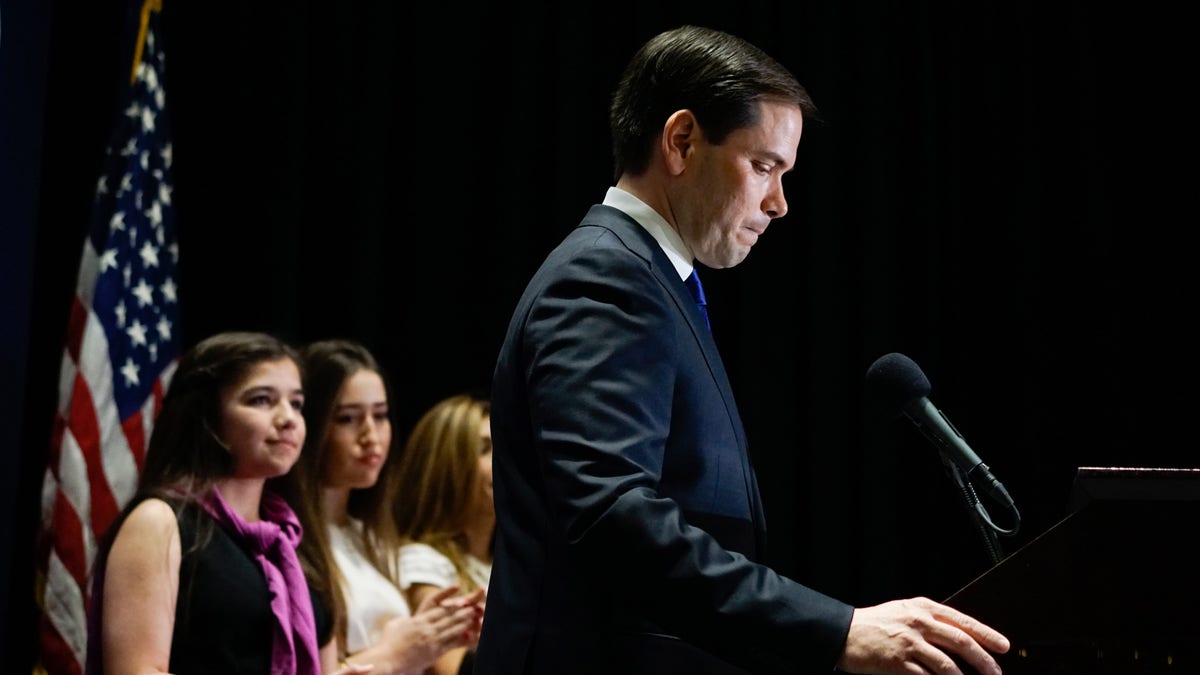
U.S. Senator Marco Rubio on March 15, 2016 in Miami, Florida. (2016 Getty Images)
Miami – Within the first few minutes of his concession speech Tuesday night, Marco Rubio summed up why his once promising presidential campaign that began with hundreds of supporters packed into Miami’s iconic Freedom Tower flamed out with only a smattering of his backers sharing elbow room with news reporters inside the cramped lobby of Florida International University Arena.
"America is in the middle of a real political storm, a real tsunami and we should have seen this coming," Rubio said.
Indeed, it’s difficult to see a tidal wave bearing down on you when you rarely visit the shoreline.
Since launching his presidential campaign 11 months ago, the one-term U.S. senator and his closest advisors adopted a strategy that relied on the candidate benefiting from a bountiful amount of free national press. With his boyish good looks, impeccable communication skills, and Cuban-American pedigree, Rubio was touted as the Latino Republican version of Barack Obama. As a result, Rubio and his brain trust banked that they would not need to mount a very expensive ground campaign to woo voters in early primary and caucus states because the senator would be on people’s televisions round the clock.
The fact that I have even come this far is evidence of how special America truly is and all the reason more we must do all we can so this nation remains a special place.
They miscalculated Donald Trump’s natural ability to turn media attention on himself like a category five hurricane barreling toward Miami. After all, the real estate billionaire is no stranger to the limelight, having spent 14 seasons as the face of reality shows, "The Apprentice" and "Celebrity Apprentice."
Over the last three months, Rubio openly complained to media outlets that Trump was getting an unreasonable amount of coverage because of the presidential front-runner’s boorish antics and commentary. Two days before the Florida primary, Rubio was on ABC’s This Week when he grumbled about Trump’s dominance of the television airwaves.
“I mean, if you think about Donald Trump, he says these outrageous and offensive things, his speeches get covered live by cable networks, wall to wall,” Rubio said. “I know he’s good for ratings to cover these speeches because of what he might say, but I think the media’s responsible for some of this.”
It didn’t help that Rubio’s campaign also spent the nine months of his campaign exchanging gunfire with Jeb Bush, his one-time mentor and former Florida governor, and the Super PAC Right-To-Rise, which spent nearly $40 million of its $100 million-plus war chest attacking the senator.
Despite notching wins in Minnesota, Puerto Rico and the District of Columbia, the lack of ground game was evident in Rubio’s third-place finish in the Iowa caucuses and second-place finishes in South Carolina and Nevada.
Still, at one point Rubio was well poised to take on the mantle of Republican Party establishment candidate that could possibly thwart Trump. His chances rose after a strong performance in an early debate when he counter-punched Bush’s attack on his absentee senate record. But then came another debate, in which Rubio allowed New Jersey Gov. Chris Christie to paint him as the type of D.C. politician conservative voters have contempt for.
“Let’s dispel with this fiction that Barack Obama doesn’t know what he’s doing,” Rubio said, after criticizing Christie’s record as New Jersey governor. “He knows exactly what he’s doing. He is trying to change this country. He wants America to become more like the rest of the world.”
Christie jumped on Rubio’s commentary as canned political speak. “You see, everybody — I want the people at home to think about this,” Christie rebutted. “That’s what Washington D.C. does: the drive-by shot at the beginning, with incorrect and incomplete information, and then the memorized, 25-second speech that is exactly what his advisers gave him.”
Instead of pivoting, Rubio repeated his Obama line four more times. Everyone, from national magazines to Democratic protestors to social media trolls, pounced on Rubio’s gaffe. A GQ headline asked, “Why did Marco Rubio decide to run as a robot?” During a New Hampshire campaign stop following the debate, two protesters from the liberal group American Bridge 21st Century in robot costumes made of cardboard heckled Rubio.
To combat Rubio’s newly minted image of a cold, scripted candidate, his campaign suddenly allowed members of the press to spend quality time with the senator on the stump. Once Bush left the race after the South Carolina primary, Rubio decided it was time to take on “the Donald.”
The strategy initially worked as Rubio relentlessly attacked Trump on his newfound conservatism and his business record. He repeatedly accused the New York developer of being a con artist out to steal the Republican Party. But then Rubio decided to engage in gutter politics by trying to match Trump with personal insults. At a Feb. 28 campaign stop in Salem, Virginia, Rubio mocked the size Trump’s small hands and alluded to the size of his opponent’s manhood.
Rubio’s new ploy ultimately failed to sway voters on Super Tuesday as he only won Minnesota. Meanwhile, the campaign had done little to set up a grassroots get-out-the-vote strategy for the senator’s home state of Florida. Some Rubio backers privately complained to Fox News Latino that the campaign waited too long to open satellite offices in crucial parts of the state like the I-4 corridor.
Still, Rubio told his supporters last night that remaining in the race for as long as he did shows the country is ready for a Latino commander-in-chief.
“While it is not God’s plan that I be president in 2016 or maybe ever,” Rubio said. “The fact that I have even come this far is evidence of how special America truly is and all the reason more we must do all we can so this nation remains a special place.”




